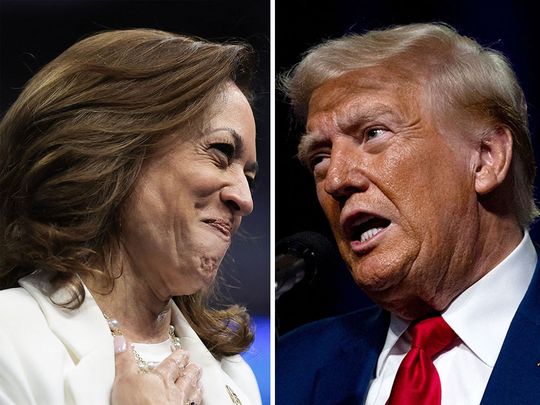
With less than three weeks remaining before Americans vote in one of the most crucial presidential and legislative elections in modern US history, the rest of the world will watch with unease. This will be one of the closest races even between the two leading presidential nominees: Former President Donald Trump and current Vice President Kamala Harris.
It’s already been a topsy-turvy contest, with President Joe Biden forced to withdraw from the race last July while endorsing Harris. The black VP will be making history if she emerges as the first African-American woman president-elect in US history. At 59, her unlikely candidacy that late in the race has shifted the focus from Biden’s senile performance and age, at 81, to Trump, who is 78.
However, while a profoundly polarised electorate ponders its candidates’ chances on 5 November, the race to the White House will be decided by voters in seven so-called battleground states or swing states. On the table are divisive issues such as illegal immigration, the borders, the economy, abortion, and gender issues, in addition to the future of the Supreme Court, which interprets the Constitution and now, with a slight conservative majority, is leaning increasingly towards approving controversial Republican agenda that is changing the face of America.
But for the rest of the world, who ends up sitting in the Oval Office deals with a series of global and regional crises. Under Biden, two major conflicts erupted and are still raging on: Russia’s invasion of Ukraine and Israel’s war on Gaza, and now Lebanon following the 7 October Hamas attacks a year ago.
A rival and enemy
Pundits will differ on how the Biden administration has dealt with the Ukraine war. There will be those who say that Biden has made the right decisions in mobilising America’s European allies to stand up against Russia. Others will argue that the US and Europe should not have backed Ukraine’s Nato membership, which Moscow had always warned against and considered a red line. They will say it is not in Europe’s interest to treat its eastern neighbour as a rival and enemy.
While Harris is likely to continue with Biden’s policy on Ukraine, thus pushing Putin to double down on his military operation in Ukraine while raising the stakes, Trump, on the other hand, promises to take a different approach. No one knows what that approach means precisely, but the former US president has always claimed to have good ties with the Kremlin’s boss. For Europe, a Trump second term could be disastrous for Nato, Ukraine’s defence, and the transatlantic alliance in general.
However, pundits can agree that Biden’s management of the Middle East crisis has been a total failure. Many Israeli politicians will also agree as they warn of Prime Minister Benjamin Netanyahu’s endless war scenario. Trump has lashed out at Biden for allowing 7 October to happen and for not giving Israel blind and total support.
Unable to take a stand
On the Democrats’ side, Biden has faced scathing attacks for failing to rein in Netanyahu and for not doing enough to stop the war. Among the Democratic far left, he is called “genocide Joe”. Even as the Israeli army is now bombing Beirut and South Lebanon, the American administration appears confused and unable to take a stand.
And when it comes to a possible showdown between Iran and Israel, one that could easily spill into a regional war, the White House is simply dazed and unable to rise to the challenge.
Harris has tried to distance herself from Biden’s failed Middle East policy by promising to end the war and giving lip service to the suffering of the Palestinians.
Trump, on the other hand, has warned that if he is not elected, Israel could disappear within years. He promised to end the war without explaining how. But he also called on Israel to take out Iran’s nuclear facilities: a recipe for a significant geopolitical upset that could quickly ignite a world crisis.
America’s regional allies would want to see Iranian influence in the region curbed, but not through a regional war. Also, its allies are not happy to see Israel redrawing the maps of the region under the guise of creating a new Middle East.
And while Harris, too, speaks of the now defunct two-state solution, Trump and his allies appear to have thrown that proposal under the bus! If Trump wins, there are genuine fears that he might back Netanyahu’s annexation of the West Bank, just as he approved Israel’s illegal annexation of the Golan Heights and East Jerusalem.
No US presidential candidate presents a safe or good choice for the region’s countries. Biden has looked the other way as Israel grabbed more Palestinian lands and is now engaging in a genocidal war. Harris lacks foreign policy experience and will rely on aides who will pursue the same policy where Israel is treated as an ally who could do no wrong.
She stands to be punished by Arab and Muslim voters, especially in Michigan, which might cost her the elections.
Trump is a maverick who is unpredictable, to say the least. In his first term, he sealed the Abraham Accords but failed to produce a realistic peace plan. His second term will be an enigma in many ways. For countries of the region, any choice puts them between a rock and a hard place.
Osama Al Sharif is a journalist and political commentator based in Amman.








_resources1_16a45059ca3_small.jpg)
